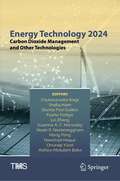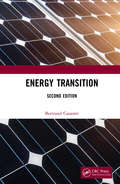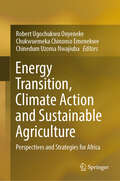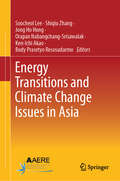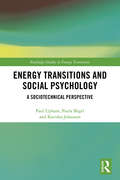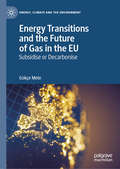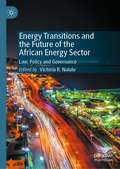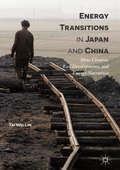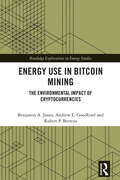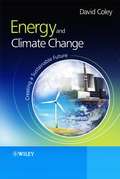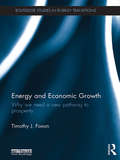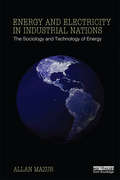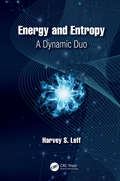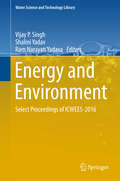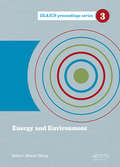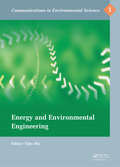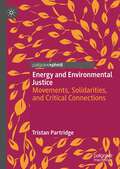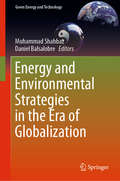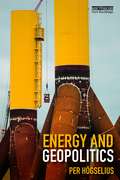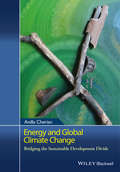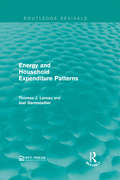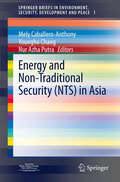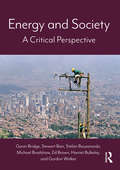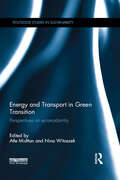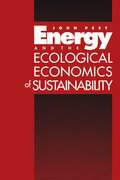- Table View
- List View
Energy Technology 2024: Carbon Dioxide Management and Other Technologies (The Minerals, Metals & Materials Series)
by Lei Zhang Neale R. Neelameggham Nawshad Haque Donna Post Guillen Shafiq Alam Onuralp Yücel Fiseha Tesfaye Alafara Abdullahi Baba Hong Peng Susanna A. C. Hockaday Chukwunwike IloejeThis collection is focused on industrial energy sustainability and CO2 management, including processes that improve energy efficiency and reduce or eliminate industrial GHG emissions. Topics address technology areas such as clean energy technologies, innovative beneficiation, smelting technologies, process intensification, as well as CO2 capture and conversion for industrial applications. Areas of interest include, but are not limited to: · Decarbonizing Materials Processing · Use of low carbon fuels, feedstock, and renewable energy resources for materials processing. · Emerging processes and techniques for industrial CO2 capture, conversion/upgrade · CO2 and other GHG reduction metallurgy in ferrous, non-ferrous and reactive metals processing, including rare-earth metals. · Energy Efficiency & Industrial Electrification · Electrification of industrial process heat and electrified production of energy carriers (e.g., hydrogen, ammonia) · Energy efficiency improvements for materials processing and smart manufacturing for optimized process control · System integration and thermal integration of process heat, waste heat recovery, and other technologies for industrial energy efficiency · Sustainability Analysis · Techno-economic life-cycle, resource efficiency and circular economy modeling of energy-intensive processes and associated material supply chains · The role of energy education and regulation in energy and materials sustainability
Energy Transition
by Bertrand CassoretThis book presents both the importance of energy transition and its associated difficulties. Energy Transition, Second Edition, provides an explanation of the physical concepts of energy and power and also reviews global energy consumption and our dependence on energy. The book discusses the links between the economy and energy. It explains the drawbacks and dangers of different energy sources and tries to compare them. By reviewing future energy resources, it evaluates several transition scenarios. The book shows that the laws of physics prevent the emergence of simple, pleasant solutions, but it proposes potential solutions and encourages readers to develop better processes from energy sources to production to consumption. This book will be of interest to engineers and undergraduate and graduate students studying and working in various fields of energy; producers of fossil, gas, oil, coal, electric, renewable, and nuclear energy; and anyone interested in better understanding these fundamental problems for our future. FEATURES Discusses the current issues with energy transition Covers several energy transition scenarios and their associated difficulties Presents the links between economy and energy Highlights the importance of a global discussion of energy Encourages the development of better, improved processes in energy sources from production to consumption
Energy Transition, Climate Action and Sustainable Agriculture: Perspectives and Strategies for Africa
by Robert Ugochukwu Onyeneke Chukwuemeka Chinonso Emenekwe Chinedum Uzoma NwajiubaThis book offers a comprehensive exploration of climate justice intertwined with energy transitions, specifically focusing on the unique challenges and opportunities in developing countries. It presents a series of in-depth studies and discussions across various dimensions such as legal frameworks, economic incentives, gender issues, and the socio-economic impacts of energy policies. By dissecting complex relationships like those between renewable energy consumption and employment in Nigeria as well as the impacts of financial development, official development assistance, institutional quality and foreign direct investment on energy transition in Africa, this book illuminates the multifaceted nature of sustainable development. Starting with an overarching introduction to the imperatives of climate justice and the necessity for energy transition, the book delves into detailed analyses including the challenges and opportunities in renewable energy, the impacts of fossil fuel dependency and reforms, and the critical role of legal and institutional frameworks in supporting just transitions. Subsequent chapters discuss the gender-specific impacts of energy policies, the potential of international partnerships, and the entrepreneurial ventures emerging within just energy markets. Further, the book addresses public engagement, the educational imperatives for climate and energy literacy, and the intricate links between climate-induced migration, conflicts, and energy policies. It also explores the economic frameworks that can facilitate a just transition, evaluates the role of carbon markets in climate justice, and assesses how energy transitions impact water and food security. The book concludes by synthesizing key findings and offering strategic recommendations for integrating climate justice into energy transition policies. This final chapter provides actionable insights for policymakers, stakeholders, and communities aimed at fostering sustainable and equitable energy solutions. Targeted at policymakers, academics, and professionals involved in energy and climate policy, as well as students and researchers, this book serves as an essential resource for anyone committed to advancing sustainable and just energy transitions in developing countries.
Energy Transitions and Climate Change Issues in Asia
by Soocheol Lee Ken-Ichi Akao Budy Prasetyo Resosudarmo Shiqiu Zhang Jong Ho Hong Orapan Nabangchang-SrisawalakThe rapid pace of economic development and urbanization in Asia have led to several major problems such as greenhouse gas emissions, mass consumption, and depletion of natural resources. These problems pose a major threat to a sustainable future for Asia and are hindering many Asian countries' goal of becoming carbon-neutral by the middle of this century. Solving these problems requires a comprehensive understanding of the nature of energy consumption, exploitation of natural resources, and deterioration of the environment.To accelerate the green energy transition and promote efficient resource use in Asia, a range of policy options and joint efforts among Asian countries will be required, including carbon pricing, resource tax reform, the expansion of transition finance, support for the development of low-carbon, and resource-efficient social infrastructure. However, Asia is home to many countries, each in a different stage of economic development and with its own culture and customs. Practical implementation of these policies will require bringing together researchers, policymakers, and citizens to share their knowledge and engage in discussions to generate policy ideas that are appropriate for each country. The purpose of this book is to share theoretical and empirical knowledge and convey policy implications that can be expected to accelerate energy transition and resource use effectiveness toward a sustainable future in Asia.
Energy Transitions and Social Psychology: A Sociotechnical Perspective (Routledge Studies in Energy Transitions)
by Paul Upham Paula Bögel Katinka JohansenThis book explains how social psychological concepts can be closely integrated with sociotechnical perspectives of energy transitions. It shows the value of actor-centred analysis that acknowledges the role of individual-level processes within their wider contexts of energy supply and use. In this way, the book connects social psychological and sociological frames of analysis, preserving the value of both, to provide multi-level, analytically extended accounts of energy transitions processes. Sociotechnical thinking is about the interactions of people and technology, including the rules, regulations and institutions involved. Such perspectives help to identify the many forms of path dependency that can make change difficult. Human behaviour plays a strong role in maintaining these path dependencies, but it can also introduce change. This book advocates a deliberately interdisciplinary research agenda that recognises the value of social psychological perspectives when seeking to create new pathways for energy supply and use. At the same time, it also demonstrates the value of sociotechnical perspectives for energy-related social psychology. Energy Transitions and Social Psychology will be of great interest to students and scholars of energy transitions, environmental and energy psychology, sustainable development and innovation studies, as well as students and scholars of environment and energy more generally.
Energy Transitions and the Future of Gas in the EU: Subsidise or Decarbonise (Energy, Climate and the Environment)
by Gökҫe MeteThis book assesses the impact of energy transitions on the future of natural gas in the EU energy mix. As we approach 2050, the requirement to sharply decrease CO₂ and other GHG emissions means that the role of gas infrastructure in the EU and beyond will change drastically. But what does such change mean? To address this question the author critically analyses the EU’s evolving natural gas market policy and law. Clearly structured throughout, the book explores the following questions: How can we maximise the potential of gas infrastructure to reduce carbon emissions? What are the lessons learned from decision making experience in the natural gas sector? Is the EU moving towards or away from a climate neutral gas sector? How will green and low carbon gas technologies be supported? And, are proposals to drive a growing share of hydrogen, biomethane, and synthetic methane to the system just an excuse to prolong fossil fuel operations?The book explores whether the EU will continue to subsidy natural gas projects or decarbonise the gas grid before 2050, and at what cost. Recommendations are proposed for a new regulatory and policy framework for development and operation of hydrogen pipelines, injection of biomethane into the existing gas grid and for pipelines carrying CO₂. Filling an important gap in the literature, this book aims to develop an understanding of and clarify the complex range of legislation involved within a single analytical framework. Although the focus is mainly on the future of gas in the EU, the findings and recommendations are relevant for a much wider geography. This book will be an invaluable reference to policy makers and practitioners as well as researchers and students across the social sciences interested in the future of energy.
Energy Transitions and the Future of the African Energy Sector: Law, Policy and Governance
by Victoria R. NaluleThis book explores current developments in the African energy sector and highlights how these are likely to be affected by the ongoing global efforts to transition to a low-carbon economy. It analyses the legal, regulatory and policy frameworks at the national and regional level as they relate to Energy transition in Africa and discusses how regionalism is increasingly utilized to tackle energy access and climate change challenges. Using case studies from across the continent, several key thematic issues, including gender justice, social license to operate, local content and conflict of energy laws are covered in detail. The authors also uniquely examine the progressive nature of global energy use and introduce the new concept of ‘Energy Progression.’ This book will be an invaluable reference for researchers and policymakers looking for a comprehensive overview of the field.
Energy Transitions in Japan and China
by Tai Wei LimThis volume focuses on the topic of energy transitions in the coal mining industries of China and Japan by adopting a Sino-Japanese comparative approach in area studies to examine the experiences between the two major East Asian economies. In China, rapid industrialization led to dramatic growth in energy demand and much of this energy demand was fueled by affordable coal energy. With growing social concerns about the environment and an increasingly vocal middle class in contemporary China, the authorities and state-owned enterprises are studying the use of coal fuels for its future development. In Japan, coal was also an affordable main source of energy for Japan's early post-war heavy industrialization until it was gradually replaced by oil in the 1960s. The oil shocks of the 1970s compelled Japan to look for cleaner and cheaper fuels, including nuclear power. In these energy transitions from coal to oil and then onto non-fossil fuels, the story of coal power in both countries is highlighted in this publication as a comparative study. This volume is a crucial contribution to the discussion of China's energy reforms, and required reading for scholars of climate change and society.
Energy Use in Bitcoin Mining: The Environmental Impact of Cryptocurrencies (Routledge Explorations in Energy Studies)
by Benjamin A. Jones Andrew L. Goodkind Robert P. BerrensThis book provides a unique introduction to Bitcoin mining’s energy use and environmental impacts. Bitcoin, the largest and most well-known cryptocurrency, has ignited the world of decentralized finance and digital currencies. However, Bitcoin has a major problem: it uses massive amounts of energy to produce or ‘mine’ the coins, and this energy use has tremendous environmental consequences. By recent estimates, Bitcoin mining’s global electricity use is larger than entire countries such as the Netherlands and Argentina. In this book, the authors explain the process by which Bitcoin is mined, why it requires significant energy, and what we know about where that energy comes from. It also explores the environmental impacts and associated monetary damages of this energy use. Further, the book presents the current state of scientific knowledge around these questions and provides original economic damage estimates from the authors and compares them to those of other goods and services. The book discusses links between Bitcoin and climate change, public health, air pollution, ‘e-waste’, water, and land use. It concludes by discussing alternative ways in which Bitcoin mining can be made green by using less energy, as well as the policy and regulatory challenges that may hinder progress toward this goal. Innovative and insightful, this book will be of great interest to students, scholars, and industry professionals who are researching and working in the areas of cryptocurrencies, economics, business and finance, engineering, energy, and environmental studies more broadly.
Energy and Climate Change
by David ColeyFor more information on this title, including student exercises, please visit , http://www.people.ex.ac.uk/DAColey/Energy and Climate Change: Creating a Sustainable Future provides an up-to-date introduction to the subject examining the relationship between energy and our global environment. The book covers the fundamentals of the subject, discussing what energy is, why it is important, as well as the detrimental effect on the environment following our use of energy. Energy is placed at the front of a discussion of geo-systems, living systems, technological development and the global environment, enabling the reader to develop a deeper understanding of magnitudes.Learning is re-enforced, and the relevance of the topic broadened, through the use of several conceptual veins running through the book. One of these is an attempt to demonstrate how systems are related to each other through energy and energy flows. Examples being wind-power, and bio-mass which are really solar power via another route; how the energy used to evaporate sea water must be related to the potential for hydropower; and where a volcano's energy really comes from.With fermi-like problems and student exercises incorporated throughout every chapter, this text provides the perfect companion to the growing number of students taking an interest in the subject.
Energy and Economic Growth: Why we need a new pathway to prosperity (Routledge Studies in Energy Transitions)
by Timothy J. FoxonAccess to new sources of energy and their efficient conversion to provide useful work have been key drivers of economic growth since the industrial revolution. Western countries now need to transform their energy systems and move away from the single-minded pursuit of economic growth in order to reduce our carbon emissions, and to allow the environmental space for other countries to develop in a more sustainable way. Achieving this requires understanding of the dynamics of economic and industrial change with appreciation of the dependence of economies on ecological systems. Energy and Economic Growth thus examines the links between three issues: history of energy sources, technologies and uses; ecological challenges associated with the current dominant economic growth paradigm; and the future low carbon energy transition to mitigate human-induced climate change. Providing a historical understanding of the relevant connections between physical, social and economic changes, the book enables the reader to better understand the connection between their own energy use and global economic and environmental systems, and to be able to ask the right questions of our political and business leaders. This is a valuable resource for students, scholars and policy makers with an interest in energy, climate change and economic thinking.
Energy and Electricity in Industrial Nations: The Sociology and Technology of Energy
by Allan MazurEnergy is at the top of the list of environmental problems facing industrial society, and is arguably the one that has been handled least successfully, in part because politicians and the public do not understand the physical technologies, while the engineers and industrialists do not understand the societal forces in which they operate. In this book, Allan Mazur, an engineer and a sociologist, explains energy technologies for nontechnical readers and analyses the sociology of energy. The book gives an overview of energy policy in industrialised countries including analysis of climate change, the development of electricity, forms of renewable energy and public perception of the issues. Energy is a key component to environment policy and to the workings of industrial society. This novel approach to energy technology and policy makes the book an invaluable inter-disciplinary resource for students across a range of subjects, from environmental and engineering policy, to energy technology, public administration, and environmental sociology and economics.
Energy and Entropy: A Dynamic Duo
by Harvey S. LeffEnergy is typically regarded as understandable, despite its multiple forms of storage and transfer. Entropy, however, is an enigma, in part because of the common view that it represents disorder. That view is flawed and hides entropy’s connection with energy. In fact, macroscopic matter stores internal energy, and that matter’s entropy is determined by how the energy is stored. Energy and entropy are intimately linked. Energy and Entropy: A Dynamic Duo illuminates connections between energy and entropy for students, teachers, and researchers. Conceptual understanding is emphasised where possible through examples, analogies, figures, and key points. Features: Qualitative demonstration that entropy is linked to spatial and temporal energy spreading, with equilibrium corresponding to the most equitable distribution of energy, which corresponds to maximum entropy Analysis of energy and entropy of matter and photons, with examples ranging from rubber bands, cryogenic cooling, and incandescent lamps to Hawking radiation of black holes Unique coverage of numerical entropy, the 3rd law of thermodynamics, entropic force, dimensionless entropy, free energy, and fluctuations, from Maxwell's demon to Brownian ratchets, plus attempts to violate the second law of thermodynamics
Energy and Environment
by Vijay P Singh Shalini Yadav Ram Narayan YadavaThis book comprising seven parts is organized under two sections. The first section deals with environment containing four parts, whereas the second section, containing three parts, is on energy. The first part deals with some aspects of hydrologic impacts of global warming and anthropogenic changes. Part II is on bio-environment and discusses plants, biomass, and bacterial species. Part III focuses on chemical environment. Section one is concluded with Part IV on social environment. Section two starts out with Part V on solar energy. Hydropower is discussed in Part VI. The concluding Part VII deals with biogas. The book will be of interest to researchers and practitioners in the field of water resources, hydrology, environmental resources, agricultural engineering, watershed management, earth sciences, as well as those engaged in natural resources planning and management. Graduate students and those wishing to conduct further research in water and environment and their development and management may find the book to be of value.
Energy and Environment: Proceedings of the 2014 International Conference on Energy and Environment (ICEE 2014), June 26-27, Beijing, China (IRAICS Proceedings)
by Dawei ZhengThe 2014 International Conference on Energy and Environment (ICEE 2014) was held June 26-27 in Beijing, China. The objective of ICEE 2014 was to provide a platform for researchers, engineers, academics as well as industry professionals from all over the world to present their research results and development activities in Energy and Environment res
Energy and Environmental Engineering: Proceedings of the 2014 International Conference on Energy and Environmental Engineering (ICEEE 2014), September 21-22, 2014, Hong Kong (Communications in Environmental Science)
by Yijin WuThe 2014 International Conference on Energy and Environmental Engineering (ICEEE 2014) was held September 21-22, 2014 in Hong Kong. This proceedings volume assembles papers from various professionals, leading researchers, engineers, scientists and students and presents innovative ideas and research results focused on Energy and Environmental Engine
Energy and Environmental Justice: Movements, Solidarities, and Critical Connections
by Tristan PartridgeThis book reconnects energy research with the radical, reflexive, and transformative approaches of Environmental Justice. Global patterns of energy production and use are disrupting the ecosystems that sustain all life, disproportionately affecting marginalized groups. Addressing such injustices, this book examines how energy relates to structural issues of exploitation, racism, colonialism, extractivism, the commodification of work, and the systemic devaluing of diverse ‘others.’ The result is a new agenda for critical energy research that builds on a growing global movement of environmental justice activism and scholarship. Throughout the book the author reframes ‘transitions’ as collaborative projects of justice that demand structural change and societal shifts to more equitable and reciprocal ways of living. This book will be an invaluable resource for students, scholars, and practitioners interested in transforming energy systems and working collectively to build just planetary futures.
Energy and Environmental Strategies in the Era of Globalization (Green Energy and Technology)
by Muhammad Shahbaz Daniel BalsalobreThis book provides readers with cutting-edge techniques that can be applied to energy and environmental economics. Further, it highlights the effects that both globalization and economic growth have on the environment. In addition to offering a broader perspective on the relationship between environmental pollution, energy consumption and economic growth, the book studies the relationship between economic growth and environmental damage by drawing on the theoretical hypothesis of the Environmental Kuznets Curve. The book presents new econometric techniques and innovative approaches to the study of the energy economy. Accordingly, it can be used to help analyse the current state of the energy economy, the environment and globalization, and can serve as a theoretical reference manual for doctoral students and academics seeking new analytical techniques.
Energy and Geopolitics
by Per HögseliusThe idea that energy shapes and is shaped by geopolitics is firmly rooted in the popular imagination – and not without reason. Very few countries have the means to secure their energy needs through locally available supplies; instead, enduring dependencies upon other countries have developed. Given energy’s strategic significance, supply systems for fuels and electricity are now seamlessly interwoven with foreign policy and global politics. Energy and Geopolitics enables students to enhance their understanding and sharpen their analytical skills with respect to the complex relations between energy supply, energy markets and international politics. Per Högselius guides us through the complexities of world energy and international energy relations, examining a wide spectrum of fossil fuels, alongside nuclear and renewable energies. Uniquely, the book also shows how the geopolitics of energy is not merely a matter for the great powers and reveals how actors in the world’s smaller nations are as active in their quest for power and control. Encouraging students to apply a number of central concepts and theoretical ideas to different energy sources within a multitude of geographical, political and historical contexts, this book will be a vital resource to students and scholars of geopolitics, energy security and international environmental policy and politics.
Energy and Global Climate Change: Bridging the Sustainable Development Divide
by Anilla CherianEnergy and Global Climate Change: Bridging the Sustainable Development Divide focuses attention on two urgent global development challenges faced by the UN and its member states: access to sustainable energy for all, and global climate change. This book presents compelling evidence about an often neglected aspect of the energy-climate change-development nexus faced by millions of poor: problems caused by the use of inefficient and polluting energy sources, and the lack of access to sustainable energy services. Based on a detailed examination of major UN global climate change and sustainable development negotiated outcomes over the course of several decades, this book argues in a powerful and insightful manner that intergovernmental negotiated outcomes aimed at solving the climate change and energy access challenges have been restricted by being placed in different negotiating silos. This “siloization” or compartmentalization has resulted in separate tracks of negotiated outcomes on two inextricably linked global development challenges; and, has thereby hindered prospects for integrated action. This book points out that the existence of these two silos is especially hard to ignore in light of the urgent UN-led quest for an integrated and universal post-2015 development agenda anticipated to be anchored by new sustainable development goals on energy access and climate change. By addressing the heavy reliance on inefficient and polluting energy services which result in indoor air pollution and short lived climate pollutants that tragically impact millions of poor people, this book highlights the unique importance of integrated action on the energy-poverty-climate change nexus in the UN’s post-2015 development era.
Energy and Household Expenditure Patterns (Routledge Revivals)
by Joel Darmstadter Thomas J. LareauOriginally published in 1983, Energy and Household Expenditure Patterns claimed that two-thirds of energy consumption in the United States came from households. This study aimed to estimate the expected changes in household activities and how this would affect energy consumption in the country as a whole. Also discussed are implications of direct energy purchases and spending on energy goods in households as well as predicting the growth in energy consumption leading up to the year 2000. This title will be of interest to students of Environmental Studies and Economics.
Energy and Non-Traditional Security (NTS) in Asia
by Mely Caballero-Anthony Youngho Chang Nur Azha PutraTraditional notions of security are premised on the primacy of state security. In relation to energy security, traditional policy thinking has focused on ensuring supply without much emphasis on socioeconomic and environmental impacts. Non-traditional security (NTS) scholars argue that threats to human security have become increasingly prominent since the end of the Cold War, and that it is thus critical to adopt a holistic and multidisciplinary approach in addressing rising energy needs. This volume represents the perspectives of scholars from across Asia, looking at diverse aspects of energy security through a non-traditional security lens. The issues covered include environmental and socioeconomic impacts, the role of the market, the role of civil society, energy sustainability and policy trends in the ASEAN region.
Energy and Society: A Critical Perspective
by Harriet Bulkeley Gavin Bridge Gordon Walker Michael Bradshaw Stefan Bouzarovski Stewart Barr Ed BrownEnergy and Society is the first major text to provide an extensive critical treatment of energy issues informed by recent research on energy in the social sciences. Written in an engaging and accessible style it draws new thinking on uneven development, consumption, vulnerability and transition together to illustrate the social significance of energy systems in the global North and South. The book features case studies, examples, discussion questions, activities, recommended reading and more, to facilitate its use in teaching. Energy and Society deploys contemporary geographical concepts and approaches but is not narrowly disciplinary. Its critical perspective highlights connections between energy and significant socio-economic and political processes, such as globalisation, urban isation, international development and social justice, and connects important issues that are often treated in isolation, such as resource availability, energy security, energy access and low-carbon transition. Co-authored by leading researchers and based on current research and thinking in the social sciences, Energy and Society presents a distinctive geographical approach to contemporary energy issues. It is an essential resource for upperlevel undergraduates and Master’s students in geography, environmental studies, urban studies, energy studies and related fields.
Energy and Transport in Green Transition: Perspectives on Ecomodernity (Routledge Studies in Sustainability)
by Nina Witoszek Atle MidttunThis book breaks new ground in the studies of green transition. It frames the ongoing transformation in terms of a "battle of modernities" with the emerging vision of ecomodernity as the final destination. It also offers a systematic exploration of the potential for extensive transformation of carbon-intensive sectors – with a focus on energy and transport – towards a low or post-carbon economy. The book does so in a comparative perspective, by pointing to a diversity of techno-economic and institutional solutions in the mature Western economies, and in the rapidly growing East and developing South. The contributors highlight a broad spectrum of available alternatives as well as illuminate conflicting interests involved. They also demonstrate how solutions to the climate challenge require parallel technological and governance innovation. The book advocates a new, overarching vision and agenda of ecomodernity – based on a synergistic paradigm-shift in industry, politics and culture – to trigger and sustain the ecological innovation necessary to tip development in a green direction. This vision cannot be monolithic; rather, it should reflect the diverse interests and conditions of the global population. This book is aimed at researchers and postgraduate students of energy, transport, environmental and climate policies, as well as development, environment, innovation and sustainability.
Energy and the Ecological Economics of Sustainability: The Growing Threat Of Species Invasions
by John PeetEnergy and the Ecological Economics of Sustainability examines the roots of the present environmental crisis in the neoclassical economics upon which modern industrial society is based. The author explains that only when we view ourselves in the larger context of the global ecosystem and accept the physical limits to what is possible can sustainability be achieved.
